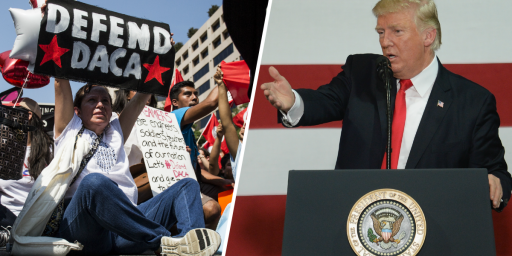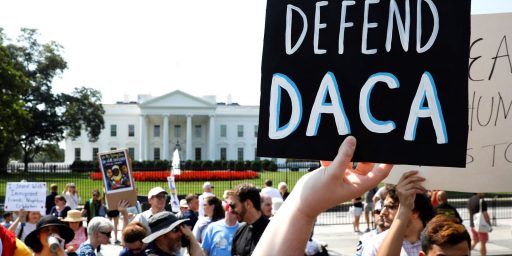Democratic States Sue Trump Administration Over Decision To End DACA
As expected, a group of Democratic states is suing the Trump Administration over the decision to end the DACA program.
A group of fifteen states represented by Democratic Attorneys General, plus the District of Columbia, has filed a lawsuit against the Trump Administration over the decision to end the Deferred Act for Childhood Arrivals (DACA) program that has given the children of illegal immigrants brought into the U.S. illegally relief from potential deportation:
President Trump’s immigration policies faced a renewed legal onslaught on Wednesday, as a coalition of Democratic attorneys general, nonprofit groups and private companies announced they would oppose his rollback of Obama-era protections for people who entered the country illegally as children.
In an echo of the campaign against Mr. Trump’s effort this year to ban travelers from parts of the Muslim world, a group of 16 attorneys general — all Democrats — filed suit in Federal District Court in Brooklyn, claiming that Mr. Trump had improperly upended the policy known as Deferred Action for Childhood Arrivals or DACA.
Led by Attorneys General Eric T. Schneiderman of New York, Maura Healey of Massachusetts and Bob Ferguson of Washington, they alleged Mr. Trump’s shift was driven by racial animus toward Mexican Americans and that the Trump administration failed to follow federal rules governing executive policy making.
On Tuesday, Attorney General Jeff Sessions announced that the Trump administration would phase out DACA beginning next March. The decision came as a group of Republican attorneys general threatened to sue the administration if it did not end the program.
Announcing the legal challenge Wednesday alongside a crowd of young immigrants and immigration advocates, Mr. Schneiderman accused the Trump administration of using the threat of lawsuits as a “pretext” that hid the president’s true motives: bias against immigrants and Latinos.
Mr. Schneiderman’s lawsuit said that “ending DACA, whose participants are mostly of Mexican origin, is a culmination of President Trump’s oft-stated commitments — whether personally held, stated to appease some portion of his constituency, or some combination thereof — to punish and disparage people with Mexican roots.”
In an interview on Wednesday, Mr. Schneiderman said, “We think the court will take a look at what’s behind the change in policy and conclude that the rationales offered yesterday don’t make any sense.”
Additional lawsuits are expected: Attorney General Xavier Becerra of California, a Democrat, intends to file a separate challenge to Mr. Trump’s plans, according to people briefed on his plans. Several major companies intend to join the lawsuits, and two, Microsoft and Amazon, have pledged to pay the legal expenses of any employees who become vulnerable to deportation.
The loosely coordinated legal strategy faces uncertain prospects, and may represent a kind of precautionary measure for supporters of DACA, who are also engaged in a ferocious campaign aimed at spurring Congress to pass a law protecting people in the program from deportation. The litigation is likely to become a political rallying point for opponents of Mr. Trump, and should the legislative effort fizzle, a court challenge could become an alternative vehicle to derail or delay his policies.
To some extent, the court battle could reproduce some of the arguments surrounding Mr. Trump’s travel restrictions, pitting the traditionally sweeping powers of the presidency against claims that this particular administration, on a specific matter of policy, had misused its authority.
But presidents typically have broad discretion in matters related to national security and border control, and legal opponents of Mr. Trump’s policy are in the awkward position of arguing that while President Barack Obama had the presidential authority to create DACA, Mr. Trump does not have the authority to freely undo it. And the government can also assert that undercutting Mr. Trump’s decision to rescind the program would impinge on his power to enforce immigration law.
Jonathan Turley, a professor at George Washington University Law School, said Mr. Obama’s program was always going to be vulnerable to the whims of his successor.
“It’d be rather curious if President Trump could not use the same authority that President Obama used to create DACA,” Mr. Turley said. Echoing conservative arguments that Mr. Obama had overstepped his power, he added: “This is a problem you have when you ignore the constitutional structure. This matter should’ve always remained in Congress.”
Much like the lawsuit that was filed by Texas and a group of conservative states regarding President Obama’s DAPA program, which extended DACA-like protection to a limited group of parents of children who were in the nation legally, the legal arguments raised by New York and its sister states follow two separate tracks:
Besides the argument that the Trump administration has violated the equal protection clause of the Constitution, the lawsuit filed Wednesday makes a more complex claim, saying that the administration failed to follow the right process, under the Administrative Procedure Act, for shutting down Mr. Obama’s program.
The states argue that DACA had become so entrenched in the immigration system that to abruptly end it was “arbitrary and capricious,” and that such a U-turn demanded a better explanation than what administration officials offered on Tuesday.
“Numerous public officials from both political parties have reinforced the federal government’s promise to provide continuity and fair treatment to DACA grantees, and have recognized that DACA grantees have relied on the government’s representations in applying for DACA,” the lawsuit said.
Michael J. Wishnie, a professor at Yale Law School who is helping to sue the administration on behalf of a DACA recipient in a separate lawsuit, said officials were, of course, allowed to change a policy.
“But when people have come to rely on it,” he said, “they have to explain themselves.”
Andrew J. Pincus, a Washington-based lawyer who has argued frequently before the Supreme Court, suggested Mr. Trump’s approach to DACA might be vulnerable in court, in part because he had done relatively little to justify it as a matter of policy.
The Trump administration has cast its withdrawal of Mr. Obama’s policy largely as a matter of legal necessity, arguing that DACA would be unlikely to survive the expected challenge from Republican attorneys general. Devin O’Malley, a spokesman for the Justice Department, defended the DACA announcement as a corrective to Obama administration overreach.
“While the plaintiffs in today’s lawsuits may believe that an arbitrary circumvention of Congress is lawful, the Department of Justice looks forward to defending this administration’s position,” Mr. O’Malley said.
But Mr. Pincus said that if a court finds the underlying DACA policy is legal, it could unravel that rationale.
“The whole basis for rescinding DACA is the conclusion that it’s illegal,” said Mr. Pincus, who is a supporter of the Obama administration policy. “If you’re wrong, your decision is arbitrary and an abuse of discretion.”
In the Texas lawsuit regarding the DAPA program, it was the failure to follow the Administrative Procedures Act that formed a large part of the basis for the initial stay that was ordered by the Federal Judge presiding over the lawsuit, as well as the initial appeal heard by the Fifth Circuit Court of Appeals in May 2015 and then again in November 2015. The Obama Administration responded by seeking and obtaining Supreme Court review of the ruling below, but a 4-4 ruling from the Court left the underlying stay in effect. In that case, the Court ruled that the Obama Administration had failed to follow the procedures set forth in the APA that call for advance publication for legislative changes and a comment period prior to the formal adoption of those changes. The comment period doesn’t necessarily mean that the policy change would be undone but is meant to provide persons with interest in the proposed regulatory changes with an opportunity to be heard on the matter and have their positions made part of the public record. In that case, as in this one, the states are in part making the argument that the Trump Administration should have followed the procedures outlined by the APA rather than announcing an end to the program in the manner that they did.
In addition to the claims under the APA, the states suing the Trump Administration are also making a series of Constitutional arguments.
The first Constitutional basis for the challenge alleges that the decision to rescind DACA was motivated in large part by the intention to discriminate against Mexican-Americans and members of other minority groups and to deny them the equal protection of the laws. In support of these allegations, the Complaint borrows heavily from the lawsuits that had been filed against Trump’s Executive Order seeking to ban immigration and travel to people from a group of predominantly Muslim nations, an order that was struck down by several Federal Courts and ultimately severely limited by a divided Supreme Court earlier this year. In those cases, of course, the Plaintiffs used many of President Trump’s own comments as a candidate for President and dating back to before he was a candidate to establish what they allege is a bias against Mexican-Americans and other predominantly Latino immigrant groups. As it turned out, those comments proved to be quite decisive in several of the adverse rulings issued against the Trump Administration regarding the travel ban, and it’s clear that the Plaintiffs are seeking to Trump’s statements against him much as they were in the travel ban case. Trump’s comments on this subject also form part of the factual basis for the APA claims in the lawsuit in that they are being used in an effort to establish that the Administration’s action was “arbitrary and capricious,” which would be a violation of the APA as well as the Constitution.
The second Constitution argument raised by the Plaintiffs arises under the Due Process Clause. In support of that argument, the Plaintiffs also rely in part on the statements that Trump has made both as a candidate and as President in support of the argument that the decision to rescind DACA violated due process principles that require the government to act with fundamental fairness. This part of the Complaint also raises the issue of what use may be made by the Federal Government of information that DACA recipients provided as part of the application process for the program, which includes contact and location information as well as other personal identification information that could be used against them as part of a deportation or enforcement procedures such as identifying, apprehending, detaining, or deporting not only DACA recipients but also friends and family members who may have been disclosed during the course of the application process.
Before even getting to these parts of the lawsuit, of course, the states who are serving as Plaintiffs in the case will have to establish that they have standing to bring a lawsuit. In the past, it was believed that it was difficult for states to bring lawsuits such as this in their own capacity due to the fact that showing a particularized injury from the policy change being disputed. However, several recent rulings from the Federal Courts, including the challenge to DAPA initiated by Texas and other conservative states and the challenges that were filed against the Trump Administration’s Muslim Travel Ban, have shown that those rules appear to have been relaxed. In this particular case, the states are alleging damages that would be imposed on them by ending the program in much the same manner as those alleged by Texas and the Plaintiff states in the travel ban case. Given that, it seems unlikely that they will face a real challenge on standing as they might have in the past.
As I noted yesterday, it appears to me that legal challenges to the President’s decision to rescind an Executive Order that was implemented by his predecessor are especially weak. The authority of a President to enter such orders is long-standing and well established, and it seems fairly clear that if one President has the authority to enter an Executive Order then a subsequent President has the authority to rescind or modify in any way he chooses. The only exception to that would appear to be a case where the initial Executive Order is subsequently passed into law by Congress, but that did not occur in this case. There is an interesting question in this regard if it turns out that a Court was to find that President Obama’s initial action was not legally supportable in some way that goes beyond the initial APA arguments against it, but this would require a separate proceeding and would also require the Plaintiffs to argue that the very program that they are seeking to keep in place was not legally authorized to begin with. If a Court were to agree with that conclusion, it would seem to make the entire case moot because they would be arguing that they want the Court to continue a program has found to have been legally unauthorized.
In any event, it’s far too early to tell where the case is headed. Initially, it’s likely that the Plaintiffs will seek to have a stay imposed blocking the timetable that the Trump Administration has set that would lead to the end of the DAPA program and which would allow authorities to continue accepting applications and renewal requests from DACA-eligible individuals. That process could take some time just on its own, and the result would be appealable both to the appropriate Circuit Court of Appeals and ultimately to the Supreme Court if necessary. If a stay is granted and upheld on appeal, it would mean that the six-month period that the Trump Administration set in motion on Tuesday would be halted. If it is not granted, or if any stay is overruled on appeal, then the countdown clock would continue and it’s probable that DACA itself would come to an end before the lawsuit is resolved. In any event, it will be some time before we have an idea of where this case is headed, meaning that the ball will remain in Congress’s court regarding any effort to save DACA by making it permanent.
Here’s the Complaint in New York et al v. Trump:
New York Et Al v. Trump Et Al by Doug Mataconis on Scribd






Which Executive order by Barack Obama authorizes DACA?
The PA AG said DACA was just “by the Federal Government ” and that getting rid of DACA violates the Rule of Law.
DACA is a SCAM
PA Attorney General Josh Shapiro Statement on DACA Lawsuit
Note no mention of Pres. Obama in the statement. just the the Federal Government.
One way or another Trump is cleaning up Obama’s mess. These “kids” will no longer be in legal limbo subject to the whim of an office holder. No doubt the Democrats hate this as it frees this future constituent group from dependency on Democrat whims.
If you actually comprehend what Trump said, there is no certainty that if the deadline passes that he wouldn’t reinstate it. But Congress has to act for the best resolution. If as the polls seem to indicate that the program is popular, then enacting it into law is best. If not, then….
Now, many have said that DACA was likely to fall in the suit against it. Where would that have left the participants? Out on there ear with no impetus for Congress to act. And then with the new and improved judicial review of past and present statements of the President to determine state of mind, then there is the issue the Obama did admit that he was making new law something on its face unconstitutional and thus making the intent of the program unconstitutional.
The new judicial use of political rhetoric for the basis of decisions is interesting. The next iteration of the English civil war will require the reining in the the judicial branch just as the first did the executive and our Revolution did the legislative. It’s down the road, but the next big battle in human liberty is being set down.